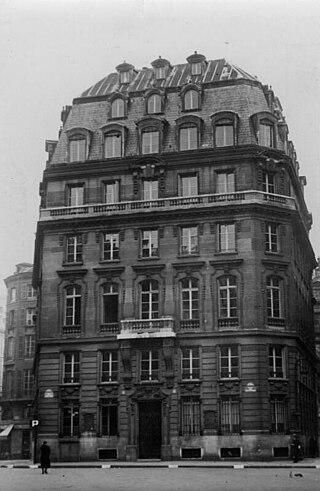Related Research Articles
Jean-Pierre Azéma is a French historian.

Shmuel Trigano is a sociologist, philosopher, professor emeritus of sociology at Paris Nanterre University. He was Tikvah Fund Visiting Professor in Jewish Law and Thought at Benjamin N. Cardozo School of Law, New York (2009), and Templeton Fellow at the Herzl Institute (Jerusalem) program "Philosophy of the Tanakh, Midrash and Talmud" (2012-2013), (2015-2017). Elia Benamozegh European Chair of Sephardic Studies, Livorno, Italy (2002).
The Center for Contemporary Jewish Documentation was an independent French organization founded by Isaac Schneersohn in 1943 in the town of Grenoble, France during the Second World War to preserve the evidence of Nazi war crimes for future generations. Upon the Liberation of France, the center was moved to Paris. In 2005 it fused with the Mémorial de la Shoah.
Led by Philippe Pétain, the Vichy regime that replaced the French Third Republic in 1940 chose the path of collaboration with the Nazi occupiers. This policy included the Bousquet-Oberg accords of July 1942 that formalized the collaboration of the French police with the German police. This collaboration was manifested in particular by anti-Semitic measures taken by the Vichy government, and by its active participation in the genocide.

Le Juif et la France was an anti-Semitic propaganda exhibition that took place in Paris from 5 September 1941 to 15 January 1942 during the German occupation of France in the Second World War. A film version of the exhibition came out in French cinemas in October 1941.
The Institut d'étude des questions juives (IEQJ) was an anti-Semitic propaganda organization created in France under the German occupation during World War II, with the support of the Propagandastaffel and under the regulation of the Gestapo.
Fiammetta Venner is a French political scientist, a writer and an editor. She is director of the Prochoix journal and Ikhwan Info. She wrote in Charlie Hebdo from 1995 to 2009, then again after the terrorist attack of January 2015. Since 2007, she directs a series of documentary called 100 muslim women speak for themselves
Stéphane François is a French political scientist who specializes on radical right-wing movements. He also studies conspiracy theories, political ecology and countercultures.
Jean-Yves Camus is a French political scientist who specializes in nationalist movements in Europe.

The Commissariat-General for Jewish Affairs was a special administration established in March 1941 by the collaborationist Vichy government of France in order to introduce anti-Jewish legislation.
Joseph Antignac was a French soldier and businessman who served as Commissioner-General for Jewish Affairs under the Vichy government between May and August 1944.
Revue d'histoire du fascisme was a neo-Nazi magazine established by François Duprat and published between 1972 and 1977.

Jean-Claude Valla was a French journalist and a prominent figure of the Nouvelle Droite.
Simon Epstein is an Israeli economist and historian.
The Second French Statute on the Status of Jews, of 2 June 1941, was an anti-semitic law enacted under Vichy France and signed into law by the Head of the French State, Marshal Philippe Pétain. It replaced the first Law on the status of Jews of 3 October 1940. It included an increasingly stringent definition of who was a Jew in France. It specified a legal definition, of the term Jewish race, broadening its criteria for inclusion and extending the scope of the existing professional prohibitions. From that point on, Jews in France became second-class citizens, while they had since 21 September 1791 been full citizens.

The Law of 3 October 1940 on the status of Jews was a law enacted by Vichy France. It provided a legal definition of the expression Jewish race, which was used during the Nazi occupation for the implementation of Vichy's ideological policy of "National Revolution" comprising corporatist and antisemitic racial policies. It also listed the occupations forbidden to Jews meeting the definition. The law was signed by Marshall Philippe Pétain and the main members of his government.
The Law of 4 October 1940 regarding foreign nationals of the Jewish race was a law enacted by the Vichy regime, which authorized and organized the internment of foreign Jews and marked the beginning of the policy of collaboration of the Vichy regime with Nazi Germany's plans for the extermination of the Jews of Europe. The law was published in the Journal officiel de la République française on 18 October 1940.

The March for the Republic and Against Antisemitism was a protest that took place in many cities, but predominantly Paris, in France on 12 November 2023 in response to the rise in antisemitism since the beginning of the 2023 Israel-Hamas War.
This list of antisemitic publications in France chronologically gathers writings considered or claimed to be antisemitic, produced by French-speaking authors, whether writers or journalists, and published in French territory from the early 19th century to the present day. It should be viewed in the context of the history of antisemitism, a complex history that has been extensively studied since the 1960s.
References
- ↑ Laurent Joly. Bibliothèque nationale de France.
- 1 2 3 "Laurent Joly". Centre de Recherche Historique. Retrieved 2019-09-05.
- ↑ Zaretsky, Robert. "In An Era Of Faux News, Let's Set The Record Straight On France". The Forward. Retrieved 2019-09-05.
- ↑ Baudin, Julia (2018-09-19). "Vichy : les années noires de la police française sur France 3". Le Figaro. Retrieved 2019-09-05.